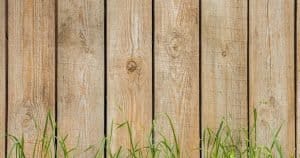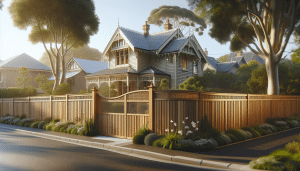Vinyl fencing has become an increasingly popular choice for homeowners and businesses alike. With its durability, low maintenance requirements, and variety of styles and colors, vinyl fencing offers a practical and attractive solution for enclosing properties. But what exactly is vinyl fencing?
Vinyl fencing is made from a type of plastic called polyvinyl chloride (PVC). It was first introduced in the 1980s as an alternative to traditional wood and metal fences. Since then, it has gained popularity due to its many advantages over other materials.
Contents
- 1 Advantages of Vinyl Fencing
- 2 Types of Vinyl Fencing
- 3 How to Choose the Right Vinyl Fence
- 4 Vinyl Fence Installation Process
- 5 Maintenance and Upkeep of Vinyl Fencing
- 6 Common Problems with Vinyl Fencing
- 7 Benefits of Hiring a Professional Vinyl Fence Installer
- 8 Why Choose Savannah Gate & Fence for Your Vinyl Fencing Needs
- 9 Frequently Asked Questions about Vinyl Fencing
Key Takeaways
- Vinyl fencing is a durable and low-maintenance option for homeowners looking to enhance their property’s appearance and security.
- Advantages of vinyl fencing include resistance to weather, pests, and fading, as well as easy customization and installation.
- Types of vinyl fencing include privacy, picket, ranch rail, and semi-privacy styles, each with their own unique features and benefits.
- When choosing a vinyl fence, consider factors such as style, height, color, and budget, as well as any local regulations or homeowner association rules.
- Proper maintenance of vinyl fencing involves regular cleaning and inspection, as well as avoiding harsh chemicals and power washing. Hiring a professional installer can ensure proper installation and long-term durability.
Advantages of Vinyl Fencing
One of the main advantages of vinyl fencing is its durability and longevity. Unlike wood, which can rot or warp over time, vinyl is resistant to moisture, insects, and other environmental factors that can cause damage. This means that vinyl fences can last for decades without needing to be replaced.
In addition to its durability, vinyl fencing is also low maintenance. Unlike wood fences that require regular staining or painting, vinyl fences only need occasional cleaning with soap and water to keep them looking their best. This makes vinyl fencing a convenient option for busy homeowners who don’t have the time or desire to spend on maintenance.
Another advantage of vinyl fencing is the variety of styles and colors available. Whether you prefer a classic white picket fence or a modern privacy fence, there is a vinyl option to suit your taste. Vinyl fences can also be customized with decorative accents such as lattice panels or post caps, allowing you to create a unique look for your property.
While the upfront cost of vinyl fencing may be higher than other materials such as wood or chain link, it is cost-effective in the long run. Because vinyl fences require minimal maintenance and have a long lifespan, they can save you money on repairs and replacements over time. Additionally, vinyl fencing is resistant to fading, so you won’t have to worry about repainting or staining it every few years.
Lastly, vinyl fencing is an eco-friendly choice. Unlike wood fences, which require trees to be cut down, vinyl fences are made from recycled materials and can be recycled themselves at the end of their lifespan. Choosing vinyl fencing helps to conserve natural resources and reduce waste.
Types of Vinyl Fencing
There are several different types of vinyl fencing to choose from, depending on your needs and preferences.
Privacy fences are a popular option for homeowners who want to create a secluded outdoor space. These fences are typically tall and solid, providing maximum privacy and security. They can be installed with or without decorative accents such as lattice panels or post caps.
Picket fences are a classic choice for adding charm and curb appeal to a property. These fences are shorter and have evenly spaced vertical pickets, creating an open and inviting feel. Picket fences can be customized with different picket styles, such as pointed or scalloped tops, to suit your aesthetic preferences.
Ranch rail fences, also known as split rail fences, are a popular choice for rural properties or those with a rustic aesthetic. These fences consist of horizontal rails attached to vertical posts, creating a simple and open design. Ranch rail fences can be installed with two or three rails, depending on the desired level of containment.
Pool fences are specifically designed to meet safety regulations for enclosing swimming pools. These fences are typically tall and have self-closing gates with childproof latches. Pool fences can be customized with decorative accents to match the style of your property.
Semi-private fences offer a compromise between privacy and openness. These fences have alternating panels that provide some privacy while still allowing airflow and visibility. Semi-private fences are a great option for properties that want to create a boundary without completely blocking off the view.
How to Choose the Right Vinyl Fence
When choosing a vinyl fence for your property, there are several factors to consider.
First, think about the purpose of the fence. Are you looking for privacy, security, or simply to enhance the aesthetic of your property? This will help you determine the height and style of the fence that will best meet your needs.
Next, consider the desired style and color of the fence. Vinyl fences come in a variety of styles, from traditional to modern, and can be customized with different colors and accents. Take into account the architectural style of your home and any existing landscaping when choosing a fence style and color.
Once you have an idea of the style and color you want, measure the area where the fence will be installed. This will help you determine how much material you will need and give you an estimate of the cost. It’s also important to check with your local building codes to ensure that your fence meets any height or setback requirements.
Finally, set a budget for your vinyl fence project. While vinyl fencing is generally more expensive than other materials upfront, it can save you money in the long run due to its low maintenance requirements and long lifespan. Consider the cost of materials, installation, and any additional features or accessories you want to include in your budget.
Vinyl Fence Installation Process
Installing a vinyl fence requires careful planning and attention to detail. Here is a general overview of the installation process:
1. Preparation of the area: Before installing a vinyl fence, it’s important to prepare the area by clearing away any vegetation or debris. This will ensure that the fence has a solid foundation and won’t be obstructed by obstacles.
2. Setting the posts: The first step in installing a vinyl fence is setting the posts. This involves digging holes for each post and securing them in place with concrete or gravel. The posts should be spaced evenly along the desired fence line and set at a depth that provides stability.
3. Installing the rails and panels: Once the posts are set, it’s time to install the rails and panels. The rails are attached to the posts using brackets or screws, and the panels are then attached to the rails. It’s important to ensure that the rails and panels are level and properly aligned to create a straight and even fence.
4. Attaching the gate: If your vinyl fence includes a gate, it will need to be installed separately. The gate should be attached to the posts using hinges and secured with a latch or lock for security. It’s important to ensure that the gate swings freely and closes securely.
5. Finishing touches: Once the fence is installed, take the time to inspect it for any imperfections or loose components. Make any necessary adjustments or repairs to ensure that the fence is secure and visually appealing. Consider adding decorative accents such as post caps or lattice panels to enhance the overall look of the fence.
Maintenance and Upkeep of Vinyl Fencing
One of the major advantages of vinyl fencing is its low maintenance requirements. However, there are still some steps you can take to keep your vinyl fence looking its best:
– Cleaning the fence: Vinyl fences can be cleaned with soap and water using a soft brush or sponge. Avoid using abrasive cleaners or tools that could scratch or damage the surface of the fence. Regular cleaning will help remove dirt, grime, and mildew, keeping your fence looking fresh and bright.
– Inspecting for damage: Periodically inspect your vinyl fence for any signs of damage, such as cracks, chips, or loose components. Repair any issues as soon as possible to prevent further damage and maintain the integrity of the fence.
– Repairing any issues: If you notice any damage to your vinyl fence, such as a crack or a loose rail, it’s important to repair it promptly. Small cracks can often be repaired with vinyl patch kits, while larger issues may require replacing a section of the fence. Follow the manufacturer’s instructions for repairing your specific type of vinyl fence.
– Protecting from UV rays: Vinyl fences are resistant to fading, but prolonged exposure to sunlight can still cause some discoloration over time. To protect your fence from UV rays, consider applying a vinyl protectant or using a fence cover during the hottest months of the year. This will help preserve the color and appearance of your vinyl fence.
Common Problems with Vinyl Fencing
While vinyl fencing is known for its durability, there are some common problems that can occur over time:
– Cracking and fading: Although vinyl fences are resistant to cracking and fading, extreme temperatures and weather conditions can cause some damage. Exposure to freezing temperatures or intense heat can cause the vinyl to become brittle or fade in color. Regular maintenance and protection from the elements can help prevent these issues.
– Warping and sagging: Vinyl fences can sometimes warp or sag due to changes in temperature or improper installation. This can result in an uneven or unattractive appearance. Proper installation and regular maintenance can help prevent warping and sagging, but if these issues occur, they may require professional repair or replacement.
– Discoloration: While vinyl fences are resistant to fading, they can still become discolored over time due to exposure to dirt, grime, or chemicals. Regular cleaning and maintenance can help prevent discoloration, but if it occurs, it can often be remedied with a vinyl cleaner or mild detergent.
– Damage from extreme weather: While vinyl fences are designed to withstand most weather conditions, severe storms or high winds can cause damage. Falling branches, debris, or strong gusts of wind can break or dislodge sections of the fence. If your vinyl fence sustains damage from extreme weather, it’s important to repair it as soon as possible to maintain its integrity.
Benefits of Hiring a Professional Vinyl Fence Installer
While some homeowners may choose to install their own vinyl fence, there are several benefits to hiring a professional:
– Expertise and experience: Professional vinyl fence installers have the knowledge and experience to ensure that your fence is installed correctly and meets all safety and building code requirements. They can also provide guidance and recommendations based on your specific needs and preferences.
– Proper tools and equipment: Installing a vinyl fence requires specialized tools and equipment that most homeowners don’t have. Professional installers have access to the necessary tools and equipment to complete the job efficiently and effectively.
– Time-saving: Installing a vinyl fence can be a time-consuming process, especially for those who are not experienced in fence installation. Hiring a professional allows you to save time and focus on other aspects of your project or daily life.
– Guaranteed workmanship: When you hire a professional vinyl fence installer, you can expect high-quality workmanship and attention to detail. Professional installers often offer warranties or guarantees on their work, giving you peace of mind knowing that your fence is built to last.
Why Choose Savannah Gate & Fence for Your Vinyl Fencing Needs
When it comes to choosing a company for your vinyl fencing needs, Savannah Gate & Fence is a trusted choice. Here are some reasons why:
– Quality materials: At Savannah Gate & Fence, we use only the highest quality vinyl materials for our fences. Our vinyl fences are designed to withstand the elements and provide long-lasting beauty and durability.
– Experienced and professional team: Our team of experienced professionals has years of experience in vinyl fence installation. We take pride in our attention to detail and commitment to customer satisfaction.
– Customizable options: We offer a wide range of styles, colors, and accessories to choose from, allowing you to create a custom look for your property. Whether you prefer a classic white picket fence or a modern privacy fence, we have options to suit your taste.
– Competitive pricing: We understand that budget is an important consideration when choosing a vinyl fence. That’s why we offer competitive pricing without compromising on quality or service. We strive to provide our customers with the best value for their investment.
Frequently Asked Questions about Vinyl Fencing
1. How long does vinyl fencing last?
Vinyl fencing is known for its durability and longevity. With proper maintenance, a vinyl fence can last for 20-30 years or more.
2. Can vinyl fencing be painted?
Vinyl fencing is available in a variety of colors, so painting is not necessary. However, if you want to change the color of your vinyl fence, it is possible to paint it using a specially formulated vinyl paint.
3. Is vinyl fencing easy to install?
While some homeowners may choose to install their own vinyl fence, it can be a complex and time-consuming process. Hiring a professional installer ensures that the fence is installed correctly and efficiently.
4. How much does vinyl fencing cost?
The cost of vinyl fencing can vary depending on factors such as the style, height, and length of the fence, as well as any additional features or accessories. It’s best to contact a professional installer for a personalized quote based on your specific needs.
5. Can vinyl fencing withstand extreme weather?
Vinyl fencing is designed to withstand most weather conditions, including rain, snow, and wind. However, severe storms or high winds can cause damage to any type of fence. It’s important to inspect your fence after extreme weather events and make any necessary repairs as soon as possible.
In conclusion, vinyl fencing offers numerous advantages over other materials, making it an attractive option for homeowners and businesses alike. With its durability, low maintenance requirements, variety of styles and colors, cost-effectiveness in the long run, and eco-friendly properties, vinyl fencing provides a practical and aesthetically pleasing solution for enclosing properties. Whether you’re looking for privacy, security, or simply to enhance the curb appeal of your property, vinyl fencing offers a versatile and durable option. By considering the purpose of the fence, determining the desired style and color, measuring the area, and setting a budget, you can choose the right vinyl fence for your needs. Whether you choose to install the fence yourself or hire a professional, proper maintenance and upkeep will ensure that your vinyl fence remains in top condition for years to come.
If you’re a homeowner considering vinyl fencing, you may also be interested in learning how to keep your pets safe with fences. Our related article, “How to Keep Your Pets Safe with Fences,” provides valuable tips and insights on creating a secure and pet-friendly environment in your backyard. From choosing the right fence height to incorporating additional safety features, this article offers practical advice for pet owners. Check it out here!




